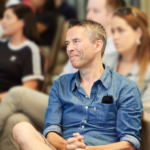Last year Matthew Pope from Investigo’s public sector team was diagnosed with ADHD – something that he never saw coming at the age of 29. As we enter Neurodiversity Celebration Week, Matt speaks to Mikayla Dorney from our DEI committee about his experience of getting diagnosed and how The IN Group helped to start him on his journey.
MD: What made you seek out the diagnosis?
MP: At one point last year, all the little tasks were piling up and it was noticed by my boss, who asked whether there was anything he could do to help. I unloaded and then The IN Group put me in touch with a former recruiter turned coaching psychologist. We had a two hour session and half an hour into it she said, “Have you ever gone through a diagnosis of ADHD?” That wasn’t even what the session was about – it was about how to plan my day better – so it caught me off guard. The psychologist didn’t actively push, she just said it was worth investigating. She put me on the pathway to getting a diagnosis and we looked at whether to do it through the NHS or privately. The waiting time on the NHS was about three years. Doing it privately was going to cost money but all things considered, I went private.
I did some research through Google and Reddit and found a diagnosis clinic called ADHD 360. It was well reviewed and they seemed to see people quite quickly, so I decided to start the process with them.
At the time, it never clicked I might have ADHD. Thanks to The IN Group for putting me in touch with somebody who was able to make that connection.
What did the process involve?
I completed 30 questions on their website where I had to select one of five options. This was followed up by a conversation with a registered nurse who went through the questions with me again over video call.
One stuck out that I answered differently online to when she spoke to me. It was about whether I find myself getting up and wandering around in meetings. The question was intended to work out if I have that motor or natural energy where other people are in a more relaxed, easy state. Even though I’d answered the questions before, it felt like more than going through the motions and there was a real value-add to doing the questions again.
While they processed the results, they sent me a blood pressure monitor to make sure I didn’t have high blood pressure if I was taking medication. I didn’t know it was coming so it was pretty surreal. For every prescription, I have to send my level in.
How long did it take to get the results?
Four weeks. Then I was on a call with a chemist who asked for my blood pressure, weight and average heartrate to make sure it was okay to give me the medication. He checked in on me every 30 days when it was time for a new prescription to see how I was and ask if there had been any changes or symptoms I’d noticed. Managing it and forcing yourself to eat are the big hurdles with the medication.
There have been eight months of contact, including repeat check in sessions once every four weeks. It’s the end of the cycle with ADHD 360 now, so the plan is to pass me on to the NHS who will do the prescriptions for me.
Prior to being medicated, what were your coping mechanisms?
I will have done certain things and not necessarily connected them to ADHD. I would go through waves of attraction to a topic or something novel or new. I was constantly churning through books to help with being productive or getting sucked into specific interests as an outlet. I’d spend hours as a kid doing the same thing, coming up with gadget coping mechanisms rather than good, healthy routines.
Most people who don’t get diagnosed learn to develop organic coping mechanisms as a child. What was your experience of getting diagnosed and medicated at the age of 29?
The barrier to getting things done now is so much lower since I started the medication. Before, my family would text me checking in, I would read it and not have the energy to respond, then not really go back to it in a reasonable timeframe. Now I always respond straight away. Communicating with me is now much easier for them, which is great.
Mikayla Dorney heads up the neurodiversity pillar of The IN Group’s DEI committee, which is a key part of our efforts to provide an equitable workplace where everyone is respected, listened to and has the opportunity to thrive.Find out more about our approach to DEI.
Share this:
Posted:
Author:
Tags:




